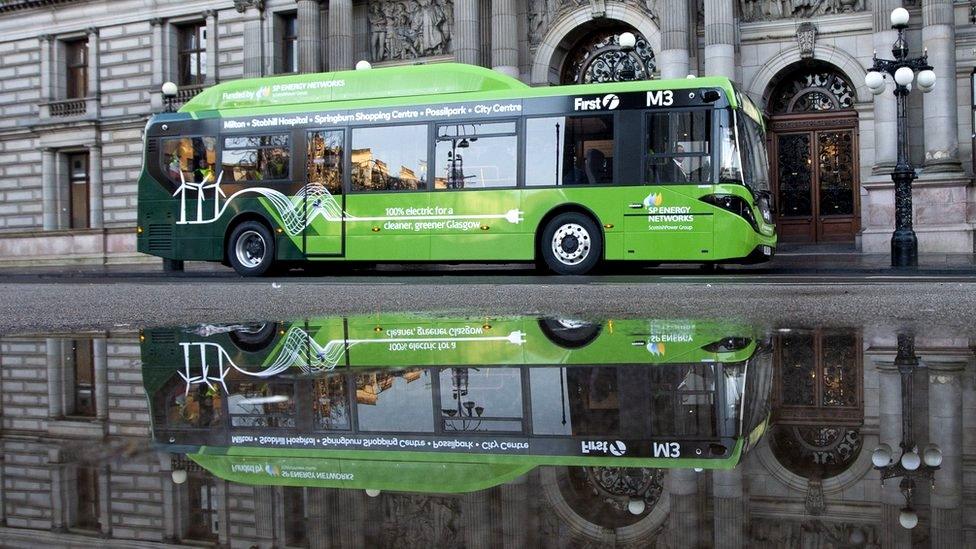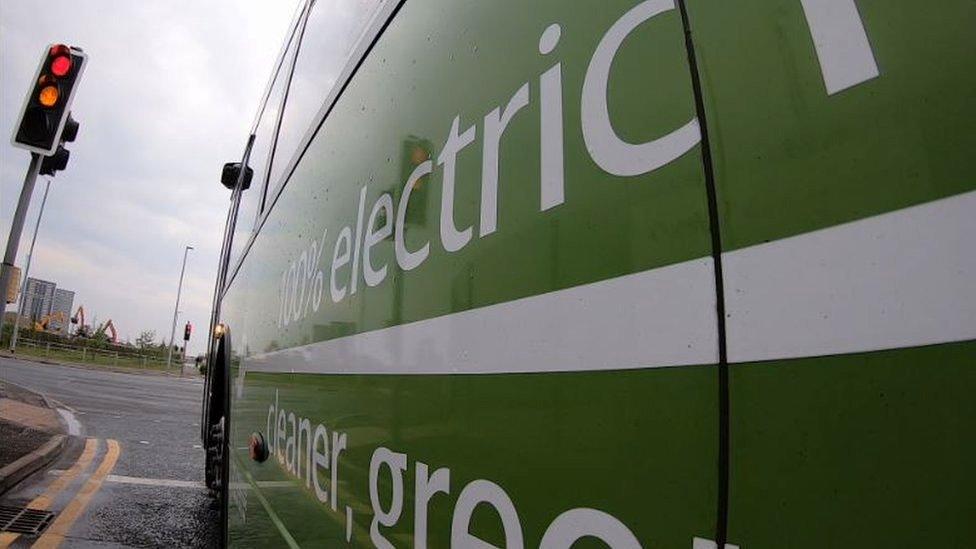Scotland to miss target on ditching most diesel buses
- Published

Transport Scotland has a "very ambitious" target to replace diesel buses with greener alternatives
The Scottish government will miss a key target to remove the majority of diesel buses from public transport by next year, according to a report.
Transform Scotland found only about 16% of the bus fleet will be electric or hydrogen powered by the end of 2023.
Its analysis of 10 transport goals stated that while some of the commitments were on track, progress in other areas had slowed or stalled.
Transport Scotland said it was "right to aim high".
The SNP's 2021 Holyrood election manifesto pledged to "remove the majority of fossil fuel buses from transport in Scotland by 2023". The ambition was repeated in ministers' Programme for Government, external.
The goal would require more than 1,850 of the country's 3,700 licensed buses to be converted to zero-emission vehicles, according to Transform Scotland, a national alliance for sustainable transport.
The organisation's report, Stuck in Traffic, external, has been published ahead of Tuesday's 2022-23 Programme for Government announcement.
It found there were approximately 280 zero-emission buses operating in Scotland, with funding awarded for another 325.
On this trajectory, more than 600 buses, 16% of the fleet, would be decarbonised by the end of 2023.
'Hugely disappointing'
Transform Scotland's report analysed 10 headline transport commitments from last year's Programme for Government.
The study said efforts to decarbonise the bus fleet, improve bus priority on Glasgow motorways and introduce fair rail fares had made "no progress" or were unlikely to meet their targets.
It identified "slow progress" on targets relating to free bus travel for under-22s, car traffic reduction, low-emission ferries, decarbonising rail services by 2035 and bus-priority infrastructure investment.
However, it said "good progress" had been made on aims to increase the active travel budget and phase out ICE (internal combustion engine) vehicles.

Scotland is not on track to hit its green bus goal
Report author Marie Ferdelman said missing the bus decarbonisation target would be "hugely disappointing" as she called on the government to step up its efforts.
"The Scottish government should be judged on whether they can deliver on what they have promised and in this case they will not be able to do so."
Ms Ferdelman added: "There has been some progress on other targets, but we observed no or only slow progress on the majority of sustainable transport commitments from the past three Programmes for Government.
"The climate emergency and the cost of living crisis require urgent action and more delay and prevarication on delivering sustainable transport commitments is not an option. Scotland needs a low carbon, affordable transport system that does not force people into expensive and polluting car dependency."
Transport Scotland said its attempt to meet the bus target had been hampered by the Covid-19 crisis.
A spokesman said: "We've always been clear that this was an ambitious target that we could not meet alone – that's why the work of our bus decarbonisation taskforce has been critical to our success so far.
"Additionally, no-one could have anticipated the profound impact of the global pandemic.
"We were right to aim high and to ensure progress across the sector – driving ambitions into delivery, with the proportion of zero emission buses in Scotland now approximately three times higher than that in England.
"Coupled with the provision of free bus travel entitlement to all under 22s across Scotland – we're putting bus at the front of our green recovery from the pandemic."